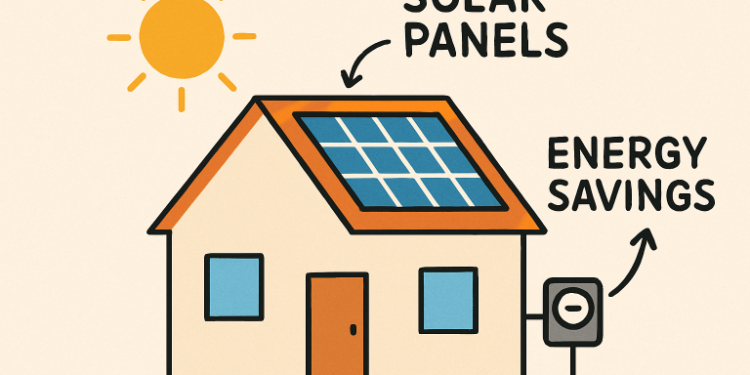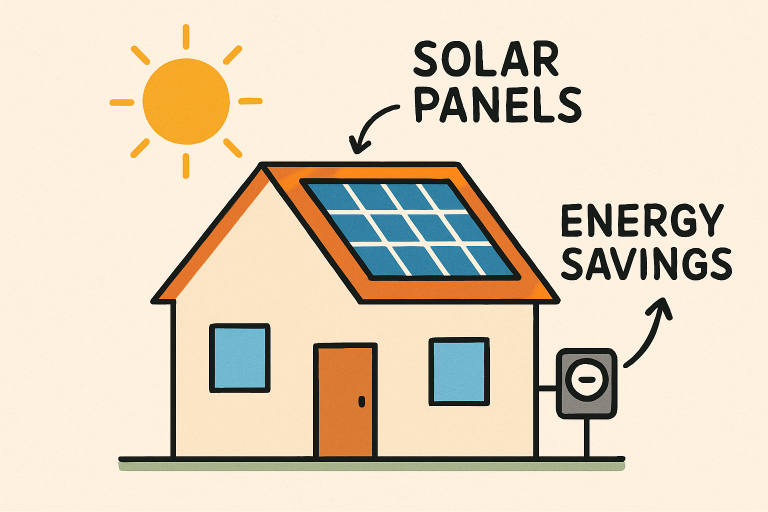Solar Panels at Home: How Residential Solar Systems Change Energy Use

Table of Contents
- 1 How Solar Panels Benefit Homeowners
- 2 Breaking Down the Science of Solar Power
- 3 Essential Steps Before Installing Solar Panels
- 4 Evaluating Costs and Incentives for Residential Solar
- 5 How Going Solar Impacts the Environment
- 6 Tips to Maximize Home Solar Efficiency
- 7 Future Trends in Home Solar Systems
- 8 Final Thoughts
How Solar Panels Benefit Homeowners
Residential solar systems are not just an environmentally conscious choice but a smart investment for modern households. By tapping into the free energy provided by the sun, homeowners can break free from unpredictable utility rates and enjoy long-term savings. Embracing solutions like solar power Daytona Beach, FL, allows homeowners to benefit from reliable, renewable energy, often slashing their monthly expenses and reducing financial uncertainties associated with traditional power sources.
The economic incentives of solar energy don’t end with utility savings. Properties equipped with high-quality solar panels consistently attract higher resale values in many real estate markets.
Breaking Down the Science of Solar Power
Solar panels leverage the power of photovoltaic (PV) cells to generate electricity. At the core of each cell, silicon wafers harness photons from sunlight, knocking electrons loose to create a flow of direct current (DC) electricity. Inverters, essential components of any residential solar system, then convert the DC electricity into alternating current (AC) that powers everyday household appliances. Efficiency levels vary based on factors such as the panel’s design, the orientation and angle of the roof, and the amount of unobstructed sunlight the system receives throughout the day.
Essential Steps Before Installing Solar Panels
- Assess your roof’s age, structure, and orientation. A south-facing roof with minimal shade captures the most energy.
- Calculate your average household energy usage, which will help size your system appropriately.
- Check for any local government or HOA restrictions that might impact installation.
- Secure the correct permits and ensure your chosen installer will coordinate with your local utility for grid interconnection.
- Obtain multiple quotes from reputable and certified solar installation professionals.
Evaluating Costs and Incentives for Residential Solar
One of the primary concerns about switching to solar energy is the upfront investment. Fortunately, costs have decreased dramatically—by over 70% in the past decade, according to the Solar Energy Industries Association. Federal tax credits and various state-level incentives make residential solar systems more attractive. These include rebates, grants, and net metering programs that compensate homeowners for excess energy sent to the grid, directly improving the return on investment for new solar installations.

How Going Solar Impacts the Environment
Adopting solar at home is not just about saving money—it’s a tangible step toward environmental stewardship. A standard-sized residential solar system can offset thousands of pounds of carbon emissions annually, greatly lowering reliance on fossil fuels and mitigating air pollution. According to the U.S. Environmental Protection Agency, home solar power contributes to cleaner air and a more resilient national energy grid, benefiting local communities and the planet.
Tips to Maximize Home Solar Efficiency
- Keep solar panels clean by clearing away dust, pollen, and debris to maximize sunlight absorption.
- Trim overhanging branches or nearby trees that cast shade over your panels.
- Utilize smart monitoring systems to track performance and quickly detect drops in output.
- Schedule professional inspections annually for preventative maintenance and to ensure system longevity.
- If energy storage or backup is a priority, consider integrating batteries to store solar power during outages or after sunset.
Future Trends in Home Solar Systems
The future of residential solar is rapidly evolving. Newer panels are thinner, sleeker, and more durable, blending seamlessly into roofs and building materials. Battery storage, once a niche addition, is becoming mainstream, empowering homeowners to maximize self-consumption and maintain energy independence during grid disruptions. As costs continue to decrease and community solar projects expand, access to solar power grows even in dense urban environments and multi-family dwellings.
Final Thoughts
Residential solar panels represent a powerful combination of environmental responsibility and financial savvy. They allow homeowners to reduce energy bills, increase property value, and contribute to a cleaner, more sustainable future. By carefully evaluating roof suitability, energy needs, and available incentives, homeowners can make informed decisions that maximize efficiency and long-term returns. With evolving technology, including more efficient panels and integrated energy storage, solar power has become increasingly accessible and effective. Ultimately, embracing solar energy promotes energy independence and positions homeowners at the forefront of a growing movement toward sustainable living.

